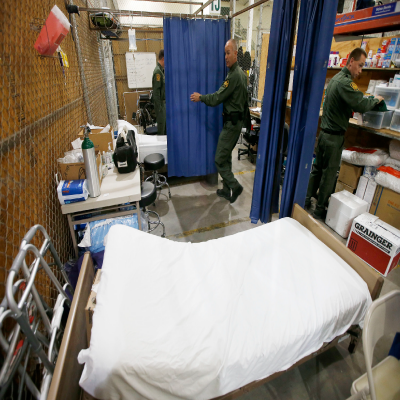
 On Tuesday, as information about the two Central American immigrants, who have been found to have active tuberculosis, became public, concerns increased for the health and safety of Border Patrol agents.
On Tuesday, as information about the two Central American immigrants, who have been found to have active tuberculosis, became public, concerns increased for the health and safety of Border Patrol agents.
The two immigrants are housed a Border Patrol facility in El Paso, but the concerns for agents’ health is widespread.
According to sources, agents have taken ill and there are few protections for them.
The U.S. Customs and Border Protection would not respond to questions about the reports and questions about Workman’s Compensation for the reportedly ill agents.
Instead they issued an official statement, that in light of the presence of tuberculosis, raise even more concerns. According to the statement Border Patrol agents have been “provided and encouraged to use personal protective gear including latex or non-latex gloves, long-sleeve shirts, and to take precaution, including frequent hand washing.”
According to CBP they have “public health controls in place to minimize any possible health risks.”
However, according to the Centers for Disease Control and Prevention, tuberculosis is spread from person to person through the air.
“TB usually affects the lungs, but it can also affect other parts of the body, such as the brain, the kidneys, or the spine. When a person with infectious TB coughs or sneezes, droplet nuclei containing M. tuberculosis are expelled into the air,” according to the CDC. “If another person inhales air containing these droplet nuclei, he or she may become infected.”
While agents have been told that if they speak out about their concerns they will face discipline including termination, Stu Harris with the National Border Patrol Council Local 1929, told ABC-7 in El Paso, “We’re concerned for our agents and they’re absolutely concerned about taking something back to their families or contracting something from these people that we have to process.”
And their families are concerned. In the Tucson Sector, according to a supporter of Congressional District candidate Shelly Kais, the candidate was approached by a wife of a Border Patrol agent who told Kais that her husband was on Workman’s Comp because he had contracted scabies.
A spokesman for U.S. Customs and Border Protection would not confirm Kais account, “due to privacy concerns,” saying that he could not “discuss medical conditions of CBP employees.”
In their official statement, CBP says that they “are conducting public health screens on all incoming detainees to screen for any symptoms of illnesses and contagious diseases of possible public health concern. CBP has established Border Station Medical Units along with the Office of Health Affairs where medical providers (physicians, physician assistants or nurse practitioners) conduct secondary medical screening and address minor medical issues. If any serious symptoms are present, individuals are referred to a medical provider or healthcare facility for treatment and medical clearance.”
According to CBP, staff receives training in illness recognition, but do not physically examine or diagnose illness. CBP officers and U.S. Border Patrol Agents contact public health authorities to help with further medical evaluation. CBP and the CDC together worked to “develop policies, procedures, and protocols to identify when a person may have a communicable disease and to handle in a manner that minimizes risk to CBP personnel, other detainees, and the public.”
CBP claims that the procedures “have been utilized collaboratively by both agencies on a number of occasions with positive results.”
Obviously there have been a quite a few unsuccessful results. In a letter dated July 4 Ronald Zermeno, health and safety director for the National Border Control Council told the chief patrol agent of San Diego’s U.S. Customs and Border Protection, that border patrol agents were not advised to decontaminate themselves or their uniforms. He added, “This demonstrates that we are not properly trained to identify infectious disease and to properly respond when we suspect a disease,” noted Zermeno.
In Arizona, officials seem oblivious to the growing health concerns.
Only Pima County Supervisor Ally Miller has called for County officials to take steps to ensure that residents, immigrants, and those personnel who are providing care to them are protected as much as possible.
Miller became concerned after her office contacted the County’s health department and Superintendent of Public Instruction and found that they have few plans in place to ensure for the community’s health as the federal government prepares to house hundreds of unaccompanied minors in facilities in the County.
Miller’s office has received numerous phone calls from concerned Pima County residents. “On Monday, my staff contacted the State Department of Health, the CDC and our own County Health Department to get answers for our residents. I was a bit taken back because no one, as of this evening, has responded with what plan is in place to educate, inform and provide oversight on this threat of infectious disease spreading in Pima County. Instead, we have been told they are working on getting more information to us and I hope to have answers by the end of this week. The health and safety of all Pima County residents is and will remain a concern for this office and I will be keeping a close watch on this situation.”
Last week, a Border Patrol agent was diagnosed with scabies after processing undocumented immigrants in Otay Mesa, California. The agent told Zermeno, that he observed several people with open sores while screening them in preparation to be released to U.S. Immigration and Customs Enforcement.
